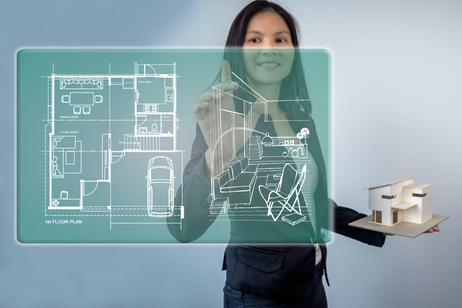AI is fast transforming the way businesses operate. So, I was curious how AI might affect our K012 classrooms. The inevitable sensational headlines, such as "Will AI replace teachers?" generate tons of speculation by the talking heads on TV and blogwriters looking for the next way to scare their readers. However, having been a teacher at both the K-12 and college levels, I can tell you that AI will not replace our teachers any time soon. With that in mind, let's look at some of the ways AI can enhance teaching and the things AI cannot do.
Successful Uses of AI in the Classroom
AI is another tool that can be used successfully by both teachers and students. I look at AI the same way I have viewed slide projectors, televisions, smartboards, computers, and all the other bits and pieces of technology that have appeared in our classrooms over the years, i.e., they help present the material I am teaching. People learn in so many different ways. Depending on the material you are presenting one of these technologies might spark that "Eureka!" moment we teachers all seek. While our student may not run into the streets as Archimedes did, she will have that look that says, "I got it!" Ultimately, it is always up to us teachers to remember that one size does not fit all. Each student learns in her way. Varied ways of presenting what you are teaching will help make the material understood.
Personalized Learning
AI-powered adaptive learning platforms like Carnegie Learning and Knewton can customize learning activities and content in real time based on a student's performance and needs. This allows for more personalized and targeted instruction. Remember programs such as MathBlaster from the 80s? The principle is the same. When your student needed to practice multiplication or division, MathBlaster made learning less boring and more fun.
Automating Administrative Tasks
AI chatbots and virtual assistants can handle routine student queries about course information, schedules, and other administrative tasks, freeing up teachers' time. AI offers another way of answering FAQs.
Grading and Feedback
Back in the 90s, I computerized several private schools. I transformed the teachers' grade books from pen-and-paper-driven vehicles to electronic grade books with all student data stored in a database. AI can save teachers time and allow for more frequent, accurate feedback.
Lesson Planning and Content Creation
AI tools like MagicSchool.ai can help teachers generate lesson plans, quizzes, and educational content tailored to their students' needs. When I was teaching, I had to prepare my lesson plans by hand in my lesson plan book before I met with the school principal. An AI tool would help any teacher perform this critical task efficiently.
Accessibility Support
AI-powered assistive technologies can help students with special needs access educational materials more equitably, such as by reading passages aloud for visually impaired students. Explore the accessibility tools that come with your computer. AI can customize those settings for a specific student login.
Writing Assistance
AI writing tools can help students brainstorm ideas, improve their writing skills, and optimize their study time. The keyword is "help." AI is a powerful way to research and plan content creation. I use Grammarly to review everything I write. While I taught English years ago and consider myself proficient, Grammarly manages to catch syntactical and other errors, offering me alternatives that match my writing style.
This video offers some AI tools for teachers.
Tasks AI May Not Be Well-Suited For
In this section, I explain why AI will never replace teachers. While teachers teach their subjects, they also guide and inspire their students. Doing that effectively requires both a gift for teaching and years of experience. AI tools don't know how to teach. They can do what you ask but don't know how to inspire or build confidence. They can say the right things, but that's no substitute for that look of approval and affirmation a teacher gives her student.
Fostering Critical Thinking
Teaching critical thinking requires the human interaction and guidance of a teacher. Because we know how our student learns, we can explore the many facets of a concept, always confirming that our student understands what we are discussing before moving on to the next item. You cannot simply open a firehose of information and hope a student can determine what fact and fiction are. The disinformation era has exposed the appalling lack of critical thinking skills.
Emotional Intelligence and Social Skills
I use an AI-powered app to monitor the Intermittent Fasting program I am on. The app has an AI-powered "coach," which is helpful for things such as recipes, nutrition, and related questions. But it is only as valuable as the person asking the questions. You've used chatbots on commercial sites. They usually are only as good as the folks who programmed them.
Ethical Decision-Making
AI-powered tools cannot teach right and wrong, morality, spirituality, and ethical issues. They can tell you who Dietrich Bonhoeffer was, but they cannot teach ecumenicism.
This video posits why AI will not replace teachers.
Detecting and Preventing Cheating
While AI can assist with grading, it's not consistently effective at catching cheating. I think that was a worry when AI first appeared. Teachers were suddenly concerned that students would submit work written by ChatGPT and pass it off as their own. However, teachers have many ways of assessing progress where AI cannot be used.
Providing Personalized Feedback
AI-powered tools tend to provide a "one size fits all"approach to personalized feedback. Teachers may use rubrics to grade papers, but their comments and feedback are nuanced and designed to help the students in front of them.
AI will help teachers manage the many tasks involved in classroom teaching. However, AI is no substitute for the dedicated, committed teacher who teaches to transform lives and society.
Questions? Contact us on Facebook. @privateschoolreview






















